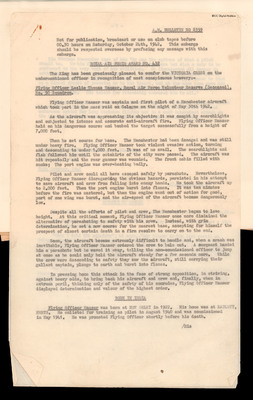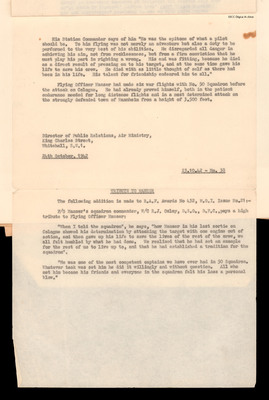Citation for award of Victoria Cross to Flying Officer Leslie Thomas Manser
Title
Citation for award of Victoria Cross to Flying Officer Leslie Thomas Manser
A.M. Bulletin No 8359
Royal Air Force Award No 432
Description
Relates actions of Manser as captain of Manchester during the first 1,000 bomber operation on Cologne on 30 May 1942. After damage to aircraft Manser persisted in efforts to save aircraft. Once crash was inevitable he ordered his crew to bail out, but remained with the aircraft until it crashed, killing him. Mentions previous operation on Mannheim. Includes tributes to Manser from his squadron commander.
Creator
Date
1942-10-24
1942-10-23
Temporal Coverage
Language
Format
Two page typewritten document
Publisher
Rights
This content is available under a CC BY-NC 4.0 International license (Creative Commons Attribution-NonCommercial 4.0). It has been published ‘as is’ and may contain inaccuracies or culturally inappropriate references that do not necessarily reflect the official policy or position of the University of Lincoln or the International Bomber Command Centre. For more information, visit https://creativecommons.org/licenses/by-nc/4.0/ and https://ibccdigitalarchive.lincoln.ac.uk/omeka/legal.
Contributor
Identifier
SCruickshankG629128v10003
Transcription
[Underlined] A.M. BULLETIN NO 8359 [/underlined]
Not for publication, broadcast or use on club tapes before 00.30 hours on Saturday, October 24th, 1942. This embargo should be respected overseas by prefacing any message with this embargo.
[underlined] ROYAL AIR FORCE AWARD NO. 432 [/underlined]
The King has been graciously pleased to confer the VICTORIA CROSS on the undermentioned officer in recognition of most conspicuous bravery:-
[underlined] Flying Officer Leslie Thomas Manser. Royal Air Force Volunteer Reserve (Deceased). No. 50 Squadron. [/underlined]
Flying Officer Manser was captain and first pilot of a Manchester aircraft which took part in the mass raid on Cologne on the night of May 30th 1942.
As the aircraft was approaching its objective it was caught by searchlights and subjected to intense and accurate anti-aircraft fire. Flying Officer Manser held on his dangerous course and bombed the target successfully from a height of 7.000 feet.
Then he set course for base. The Manchester had been damaged and was still under heavy fire. Flying Officer Manser took violent evasive action, turning and descending to under 1.000 feet. It was of no avail. The searchlights and flak followed him until the outskirts of the city were passed. The aircraft was hit repeatedly and the rear gunner was wounded. The front cabin filled with smoke: The port engine was over-heating badly.
Pilot and crew could all have escaped safely by parachute. Nevertheless, Flying Officer Manser disregarding the obvious hazards, persisited in his attempt to save aircraft and crew from falling into enemy hands. He took the aircraft up to 2.000 feet. Then the port engine burst into flames. It was ten minutes before the fire was mastered, but then the engine went out of action for good, part of one wing was burnt, and the air-speed of the aircraft became dangerously low.
Despite all the efforts of pilot and crew, The Manchester began to lose height. At this critical moment, Flying Officer Manser once more disdained the alternative of parachuting to safety with his crew. Instead, with grim determination, he set a new course for the nearest base, accepting for himself the prospect of almost certain death in a firm resolve to carry on to the end.
Soon, the aircraft became extremely difficult to handle and, when a crash was inevitable, Flying Officer Manser ordered the crew to bale out. A sergeant handed him a parachute but he waved it away, telling the non-commissioned officer to jump at once as he could only hold the aircraft steady for a few seconds more. While the crew were descending to safety they saw the aircraft, still carrying their gallant captain, plunge to earth and burst into flames.
In pressing home this attack in the face of strong opposition, in striving, against heavy odds, to bring back his aircraft and crew and, finally, when in extreme peril, thinking only of the safety of his comrades, Flying Officer Manser displayed determination and valour of the highest order.
[underlined] BORN IN INDIA [/underlined]
[underlined] Flying Officer Manser [/underlined] was born at NEW DELHI in 1922. His home was at RADLETT, HERTS. He enlisted for training as pilot in August 1940 and was commissioned in May 1941. He was promoted Flying Officer shortly before his death.
/His
[Page break]
His Station Commander says of him “He was the epitome of what a pilot should be. To him flying was not merely an adventure but also a duty to be performed to the very best of his abilities. He disregarded all danger in achieving his aim, not from recklessness, but from a firm conviction that he must play his part in righting a wrong. His end was fitting, because he died as a direct result of pressing on to his target, and at the same time gave his life to save his crew. He died with as little though of self as ther had been in his life. His talent for friendship endeared him to all.”
Flying Officer Manser had made six war flights with No. 50 Squadron before the attack on Cologne. He had already proved himself, both in the patient endurance needed for long distance flights and in a most determined attack on the strongly defended town of Mannheim from a height of 3.500 feet.
Director of Public relations, Air Ministry,
King Charles Street,
Whitehall, S.W.1.
[underlined] 24th October, 1942 [/underlined]
[underlined] 23.10.1942 – No. 38 [/underlined]
[underlined] TRIBUTE TO MANSER [/underlined]
The following addition is made to R.A.F. Awards No 432, M.O.I. Issue No.21:-
F/O Manser’s squadron commander, W/C R.J. Oxley, D.S.O., D.F.C., pays a high tribute to Flying Officer Manser.
“When I told the squadron”, he says, “how Manser in his last sortie on Cologne showed his determination by attacking the target with one engine out of action, and then gave up his life to save the lives of the rest of the crew, we all felt humbled by what he had done. We realised that he had set an example for the rest us to live up to, and that he had established a tradition for the squadron”.
“He was one of the most competent captains we have ever had in 50 Squadron. Whatever task was set him he did it willingly and without question. All who met him became his friends and everyone felt his loss as a personal blow.”
Not for publication, broadcast or use on club tapes before 00.30 hours on Saturday, October 24th, 1942. This embargo should be respected overseas by prefacing any message with this embargo.
[underlined] ROYAL AIR FORCE AWARD NO. 432 [/underlined]
The King has been graciously pleased to confer the VICTORIA CROSS on the undermentioned officer in recognition of most conspicuous bravery:-
[underlined] Flying Officer Leslie Thomas Manser. Royal Air Force Volunteer Reserve (Deceased). No. 50 Squadron. [/underlined]
Flying Officer Manser was captain and first pilot of a Manchester aircraft which took part in the mass raid on Cologne on the night of May 30th 1942.
As the aircraft was approaching its objective it was caught by searchlights and subjected to intense and accurate anti-aircraft fire. Flying Officer Manser held on his dangerous course and bombed the target successfully from a height of 7.000 feet.
Then he set course for base. The Manchester had been damaged and was still under heavy fire. Flying Officer Manser took violent evasive action, turning and descending to under 1.000 feet. It was of no avail. The searchlights and flak followed him until the outskirts of the city were passed. The aircraft was hit repeatedly and the rear gunner was wounded. The front cabin filled with smoke: The port engine was over-heating badly.
Pilot and crew could all have escaped safely by parachute. Nevertheless, Flying Officer Manser disregarding the obvious hazards, persisited in his attempt to save aircraft and crew from falling into enemy hands. He took the aircraft up to 2.000 feet. Then the port engine burst into flames. It was ten minutes before the fire was mastered, but then the engine went out of action for good, part of one wing was burnt, and the air-speed of the aircraft became dangerously low.
Despite all the efforts of pilot and crew, The Manchester began to lose height. At this critical moment, Flying Officer Manser once more disdained the alternative of parachuting to safety with his crew. Instead, with grim determination, he set a new course for the nearest base, accepting for himself the prospect of almost certain death in a firm resolve to carry on to the end.
Soon, the aircraft became extremely difficult to handle and, when a crash was inevitable, Flying Officer Manser ordered the crew to bale out. A sergeant handed him a parachute but he waved it away, telling the non-commissioned officer to jump at once as he could only hold the aircraft steady for a few seconds more. While the crew were descending to safety they saw the aircraft, still carrying their gallant captain, plunge to earth and burst into flames.
In pressing home this attack in the face of strong opposition, in striving, against heavy odds, to bring back his aircraft and crew and, finally, when in extreme peril, thinking only of the safety of his comrades, Flying Officer Manser displayed determination and valour of the highest order.
[underlined] BORN IN INDIA [/underlined]
[underlined] Flying Officer Manser [/underlined] was born at NEW DELHI in 1922. His home was at RADLETT, HERTS. He enlisted for training as pilot in August 1940 and was commissioned in May 1941. He was promoted Flying Officer shortly before his death.
/His
[Page break]
His Station Commander says of him “He was the epitome of what a pilot should be. To him flying was not merely an adventure but also a duty to be performed to the very best of his abilities. He disregarded all danger in achieving his aim, not from recklessness, but from a firm conviction that he must play his part in righting a wrong. His end was fitting, because he died as a direct result of pressing on to his target, and at the same time gave his life to save his crew. He died with as little though of self as ther had been in his life. His talent for friendship endeared him to all.”
Flying Officer Manser had made six war flights with No. 50 Squadron before the attack on Cologne. He had already proved himself, both in the patient endurance needed for long distance flights and in a most determined attack on the strongly defended town of Mannheim from a height of 3.500 feet.
Director of Public relations, Air Ministry,
King Charles Street,
Whitehall, S.W.1.
[underlined] 24th October, 1942 [/underlined]
[underlined] 23.10.1942 – No. 38 [/underlined]
[underlined] TRIBUTE TO MANSER [/underlined]
The following addition is made to R.A.F. Awards No 432, M.O.I. Issue No.21:-
F/O Manser’s squadron commander, W/C R.J. Oxley, D.S.O., D.F.C., pays a high tribute to Flying Officer Manser.
“When I told the squadron”, he says, “how Manser in his last sortie on Cologne showed his determination by attacking the target with one engine out of action, and then gave up his life to save the lives of the rest of the crew, we all felt humbled by what he had done. We realised that he had set an example for the rest us to live up to, and that he had established a tradition for the squadron”.
“He was one of the most competent captains we have ever had in 50 Squadron. Whatever task was set him he did it willingly and without question. All who met him became his friends and everyone felt his loss as a personal blow.”
Collection
Citation
Great Britain. Air Ministry, “Citation for award of Victoria Cross to Flying Officer Leslie Thomas Manser ,” IBCC Digital Archive, accessed November 7, 2024, https://ibccdigitalarchive.lincoln.ac.uk/omeka/collections/document/17848.
Item Relations
This item has no relations.


